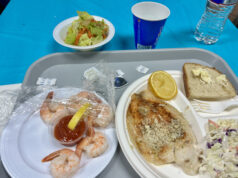There’s humorous story told of a bishop who was at a conference at which he had been asked to give a talk on spirituality that he had given a number times already. As he looked around the audience, he was noticeably agitated and was asked whether he was concerned that there might be someone in the audience who had previously heard his talk. “No,” replied the bishop “I am concerned about whether there is anyone here who hasn’t heard my talk.”
As we gather this afternoon for the closing Mass of our Eucharistic Congress, I am fairly certain that a majority of us here, like that audience, are familiar with today’s Gospel story of the disciples encountering the risen Jesus on the road to Emmaus. That being said, however, I would also suggest that it is a story that is ever new since it is the Word of God, and as God’s Word, it speaks to us today in a new and fresh way.
A Village named Emmaus
This lesson came home to me a number of years ago when I was on a pilgrimage to the Holy Land. Going on such a pilgrimage is an opportunity to visit the various places that we hear about in the Gospels. Within the first several days of the pilgrimage, I asked the guide when we would be going to Emmaus — the town to which Cleopas and his companion were traveling in today’s Gospel. I still remember his answer: he informed me that there are a number of different towns around Jerusalem that over time have been known as Emmaus and, hence, there is no consensus on which particular town the two disciples were traveling to on that first Easter day. As I thought about his words, I realized that was itself a lesson. It reminds us that the story of Emmaus is more than a tale of a physical journey, but it is reflective of what takes place in each of our lives as Christ makes himself known to us. It is the story of visitation, invitation and proclamation. Permit me a word about each.
The Visitation
We begin with visitation. Jesus, whom the disciples don’t recognize, meets them on the road. They have just experienced the crucifixion and the death of the One whom they had hoped “would be the one who would redeem Israel.” They tell Jesus that there have been reports that the tomb is empty and that some women have reported that a vision of angels has announced that Jesus was alive. They are apparently not putting much stock in the reports, however, and are “downcast” as they encounter this seeming stranger on the road. And it is Jesus who takes the initiative and starts explaining the scriptures to them. Cleopas and his companion are strong reminders to us of how God especially comes to us in our weakness, in our suffering, at those moments of sadness and dejection. The well-known story of footprints in the sand conveys this in a beautiful way. It relates the story of being told that Jesus will always walk with us and yet in looking back over one’s life, one sees that during times of greatest difficulty there is only one set of footprints. The story concludes by Jesus saying that at those difficult moments when one was seemingly all alone, one was actually being carried by Jesus. I once heard it said that Jesus loves all of us equally, but he especially prefers to be with the poor and suffering. May we always know that regardless of any heartache, pain, anxiety and difficulty we face today or in the future, we do not face it alone and Jesus is especially close to us during those times.
The Invitation

Having joined Cleopas and his companion, Jesus walks with them and explains the scriptures to them. Eventually, however, theyreach their destination and Jesus indicates that He is going on further. It is then, to Cleopas’ great credit, that he extends an invitation to Jesus that He stay with them. The choice that Cleopas faced — whether or not to invite Jesus into his home — is the same choice that we face: God gives us the freedom to choose whether or not we wish Him to be part of our lives. Jesus never forces Himself upon us. It is ultimately up to us to choose whether or not Jesus will be our Lord and Savior. The late Presbyterian pastor, Tim Keller, tells the story of a conversation he had with a woman named Barbara Boyd that changed his life and helped him realize what inviting Jesus into his life meant. In 1971, Barbara Boyd told him that if someone said to her, “Come on in, Barbara, but stay out Boyd, it’s a bit of a problem, because I can’t separate them. You have to take the entire person of Barbara Boyd.” She then went on to say that when the Bible tells us to accept Jesus as our Lord and Savior, you can’t invite Jesus as Savior, as the One who died for us and opened the gates of heaven for us, and not also invite Jesus as the Lord of our life, the one who reigns over our lives and for whom we live. The One who guides the things we say, the values by which we live, the relationships we have with others. In the words of Barbara Boyd, “If Jesus comes into your life, He must come as both Lord and Savior! He doesn’t come into your life as a little ‘side hobby’; He comes in as Lord and Master — or not at all.” Jesus doesn’t force himself upon us. It is up to is to invite him in. May we invite him as our Lord and Savior.
The Proclamation
And lastly, we come to proclamation. As Cleopas and his companion sit at the meal, Jesus “took bread, said the blessing, broke it, and gave it to them.” And with that, their eyes were opened and they recognized Him. It is the same thing that Jesus did when He multiplied fish and loaves and fed the multitudes. It is the same thing Jesus did at the Last Supper. It is the same thing that Jesus does through the priest, everytime we come to Mass. It is through these words and actions at Mass that Jesus enters into our midst, Body and Blood, Soul and Divinity and we especially enter into Jesus’ death and resurrection.
Upon their eyes being opened, Jesus disappears from their midst. The disciples, however, have been transformed. From being dejected, they now have hearts that are on fire. They immediately leave and return to Jerusalem to tell others the Good News that Jesus lives.
There has been a visitation and an invitation. And now there is a proclamation. May our hearts, like Cleopas and his companion, be set on fire by the greatest of God’s gifts, the Sacrament of the Eucharist. May we, in the words of St. Augustine, “become what we receive” and go forth to bring Jesus to others.
At the closing Mass of the National Eucharistic Congress this past July, Cardinal Tagle told the story of a parishioner whom he knew when he was a young priest who would stay in church throughout the weekend. Whatever needed to be done, she was willing to do. One day, he made it a point to thank her for all she did in the Church. She told him that it was her pleasure since she did not like to be at home where there were so many demands made upon her. Cardinal Tagle couldn’t believe that for her being in the church was an escape from other responsibilities and he told her that, instead of staying in Church, she should GO, GO, GO. He told her that Church should not be an escape but rather she needed to go forth and bring Jesus to her family and those in her neighborhood. He told her to go and be a witness to others by the way she lives her faith, to go and be especially attentive for those moments when she might encourage a person to consider returning to Church, and to seize opportunities when she might speak to others about the importance of God and the sacraments in her life.
The Cardinal’s words are very appropriate for us as we conclude our Eucharistic Congress. May we, with hearts enflamed, go, go, go and proclaim the Good News. Unlike the Bishop’s audience in my opening story, there is a world that has not heard the Good News of Jesus Christ. Let us go forth and proclaim it. Let us GO, GO, GO.










